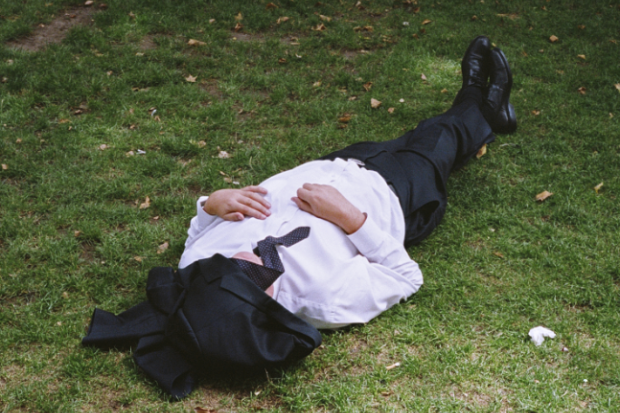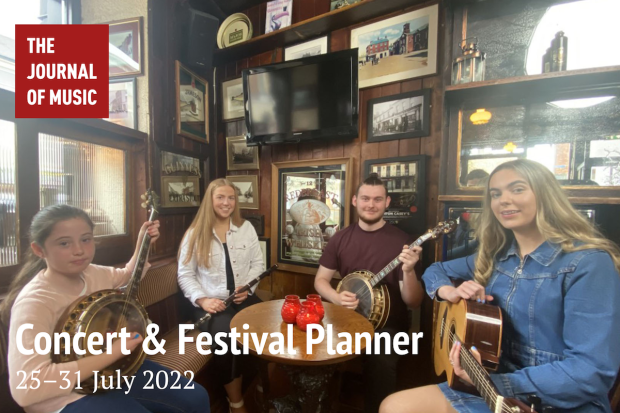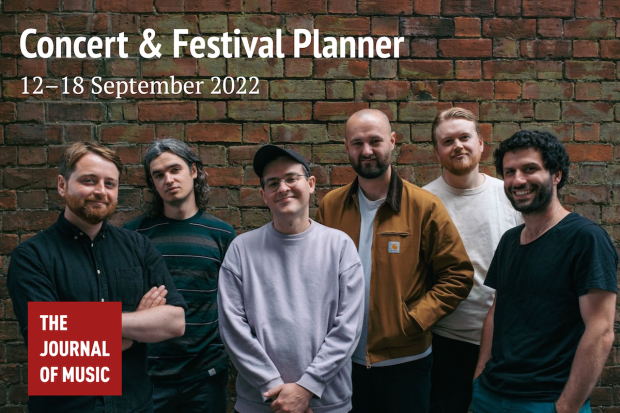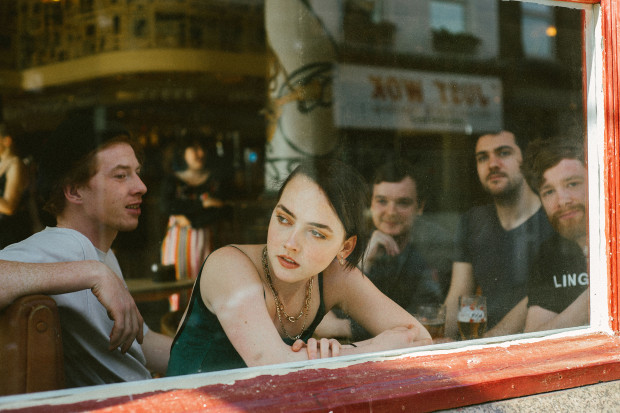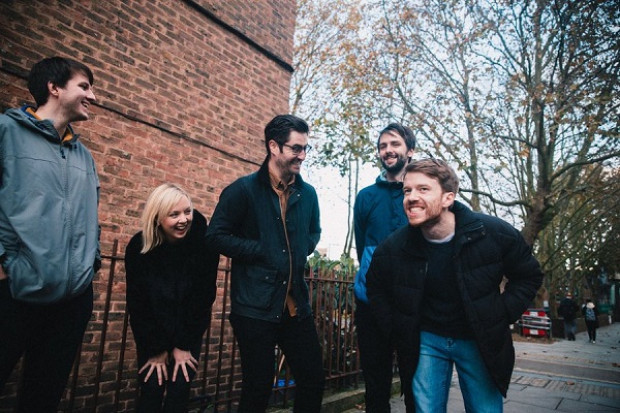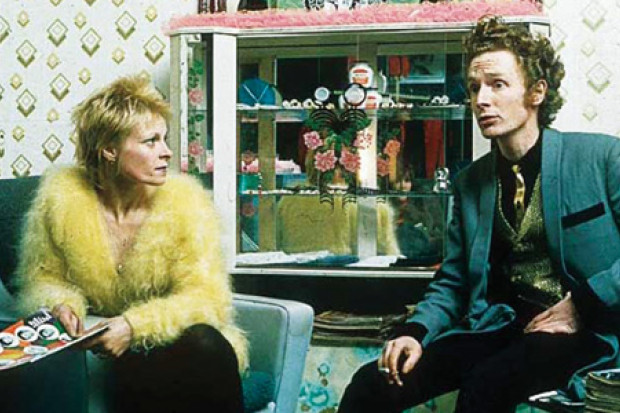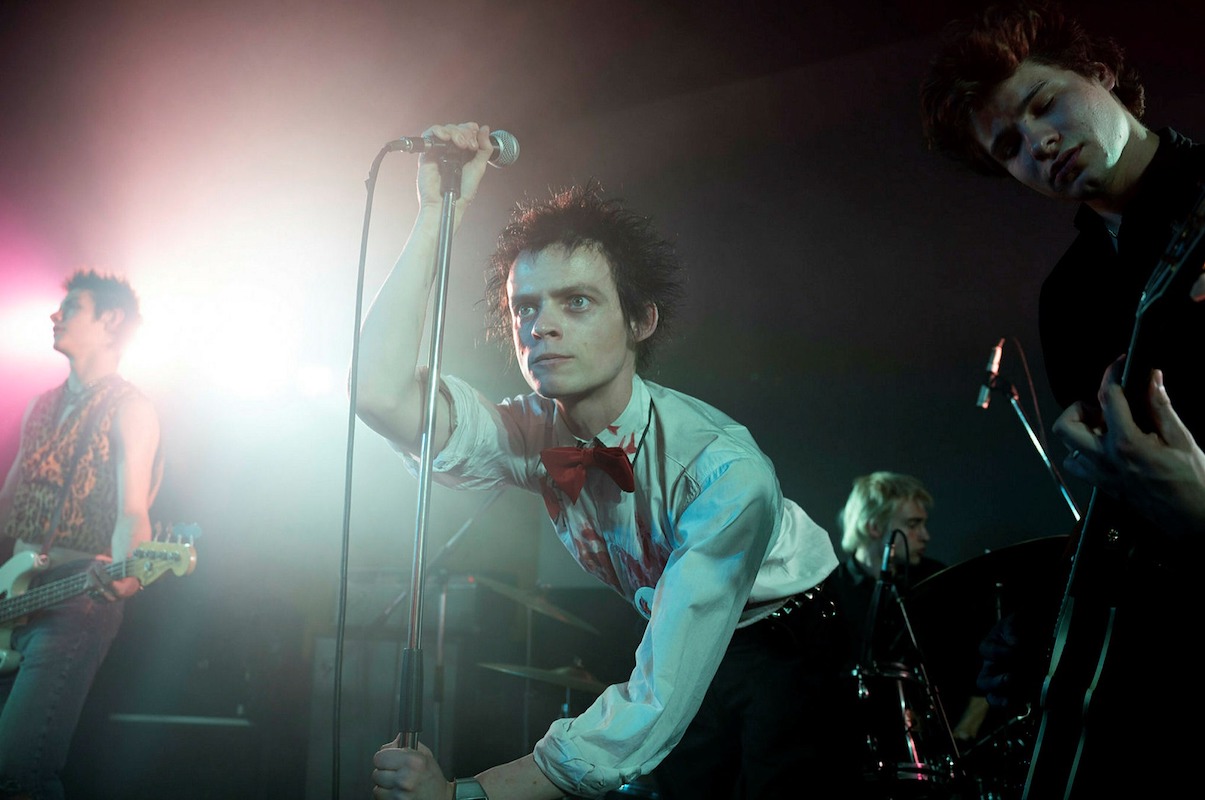
Anson Boon as John Lydon in the new series 'Pistol' (Photo: Miya Mizuno/FX)
A Generation Without Hope
In the new Disney+ series Pistol, which tells the story of the Sex Pistols, there’s a scene in which the character of singer John Lydon screams to his bandmates, ‘It’s about how our generation has no future!’ He’s speaking about their song ‘God Save The Queen’, but the sentiment is gravely familiar today.
Lydon and the band were writing music and pushing a creative wave in response to the economic decline and poor social conditions of the 1970s in Britain. Almost 60 years later, there’s a similar sense of hopelessness for today’s youth, who are dealing with dark and heavy issues such as the housing crisis, ecological disaster, and political and social uncertainty arising from a post-Brexit, post-pandemic world.
In Pistol, directed by Danny Boyle, we see the various band members come together – vocalist John Lydon (Johnny Rotten), guitarist Steve Jones, drummer Paul Cook and bassist Glen Matlock, who was later replaced by Sid Vicious – in London in the mid-1970s. The young working-class musicians find themselves in a community of artists, creatives and activists at a time when social unrest is bubbling. Over the six episodes we see scenes of picket lines, cramped high-rise apartment buildings and gloomy urban settings. The common story is that the punk movement – its music, art, politics and fashion – was initiated in this era by the Sex Pistols, but Pistol shows the wider community and scene that inherently contributed to the movement gathering momentum and becoming a reality.
We see a young Vivienne Westwood with Malcolm McLaren (her partner and the creative entrepreneur who went on to manage the band) running Sex, a boutique in central London. The two were keen to start a social and creative movement, to launch a new era for Britain with fashion, art and progressive ideals. Together they nurture and gather a crew of young, raucous and inspired people that includes members of the Sex Pistols, Chrissie Hynde and the punk fashion icon Pamela Rooke. We also see Siouxsie Sioux and the NME music critic Nick Kent intermittently, and a tribe of zealous, committed comrades. There’s a real feeling that the scene is coming together – the Sex Pistols are getting gigs and gathering attention in the media and across the country (albeit mostly in a negative light); Westwood’s boutique is full of regulars who are decked out in graphic t-shirts, ripped mohair cardigans, piercings and outlandish hair and make-up; and we view scenes of young fans sneaking out of their parents’ homes to attend gigs and be a part of it.
Reflecting the current moment
Watching Pistol, I couldn’t help but think about the current wave of post-punk in Ireland and how it too is reflective of the current moment. In the past few months, three significant albums have been released by groups in the scene; Fontaines D.C. with Skinty Fia and Just Mustard with Heart Under (both on Partisan Records), and last week Robocobra Quartet released their third album, the aptly titled Living Isn’t Easy (First Taste Records). All three bands are musically unique from one another – Fontaines D.C. with their poetic and dark guitar rock, Just Mustard with their moody downbeat layers of sound, and Robocobra Quartet whose style is as much avant-garde and jazz as it is post-punk – yet they are all connected by the undercurrents in their music.
There are more than these three however. There’s a community of musicians in related genres across the country including Pillow Queens, NewDad, Junk Drawer, MELTS, Pretty Happy and Gilla Band (formerly Girl Band). It’s also happening in Britain, with bands such as Squid, Black Country, New Road, Wet Leg, and Dry Cleaning.
Characteristics include walls of dark guitar rock, talk-singing, experimental riffs and distorted instrumentation and amplification. Thematically, they often reflect the social, political and personal unrest that has arisen over the past few years, responding to the gloom and anxiety of heavy issues including ecological disaster, the pandemic, the Russia–Ukraine war, food shortages, inflation, Brexit, the Northern Ireland protocol and growing agitation in the six counties, mass distrust in media and fake news, and the rise of the far right.
In ‘Flew Close’, the opening track of Robocobra Quartet’s new record, we hear the lyrics ‘Living isn’t easy’ against a sombre, contemplative backing of minimalist sounds on synth and percussion, with singer Chris Ryan’s signature style of talk-singing. It sets the tone for the record and aligns to the general mood of this moment – morose and bleak. In ‘Chromo Sud’, over a hazy line on saxophone, Ryan repeats the words ‘Shit house, shit flat / Got keys, got out’ over and over again, until they almost lose all meaning. Except they don’t lose meaning. Anyone in their 20s or 30s in Ireland right now can relate to the volatile nature of the housing market, whether renting or buying. ‘You know some people don’t even have enough to eat’, he later exclaims in the trippy 9-minute long saga track.
‘I Love You’ from Fontaines D.C.’s Skinty Fia is a lament for Ireland, from the perspective of an Irish man abroad. ‘But this island’s run by sharks with children’s bones stuck in their jaws’, singer Grian Chatten barks over a wash of subtle instrumentation, as the song touches on dark elements of Ireland’s past and present. ‘I will tell ‘em ‘bout it all / About the gall of Fine Gael and the fail of Fianna Fáil’.
On Just Mustard’s Heart Under, while none of the songs are overtly political, the mood is dark and the music swallows you up, drowning you in its layers of sound. Like sitting in an armchair that’s too soft, you sink into it, lowering further and further into the recesses of the material as it envelops you. With minor keys, dense and complex instrumentation, and at-time chilling vocals in singer Katie Ball’s distinct style, it’s hard not to correlate its effects with the overarching mood of this time. ‘There was sadness and sorrow in the album,’ said Ball. ‘It felt like being underwater and under something very heavy. We let that influence the music, but it wasn’t a decision – it just naturally happened that way.’
Threshold of doom
Last week, President Michael D. Higgins made an impassioned speech about the housing crisis at the opening of a facility for young homeless people near Naas, Co. Kildare, claiming that ‘it isn’t a crisis anymore, it is a disaster.’ He added:
I often ask myself… how Republican is what we created, and isn’t it sometimes very much closer to the Poor Law system we thought we were departing from.
The Group Chat podcast, hosted by news correspondents Gavan Reilly, Zara King and Richard Chambers, last week released an episode on the housing crisis, fuel prices, and the Northern Ireland protocol. Appearing on the podcast as a guest was Ciarán Mulqueen, who runs the Instagram account Crazy House Prices. Mulqueen, who has become a significant voice in the conversation on the crisis, says within the first few minutes of the interview, ‘we’ve hit the threshold of doom’, regarding the stories he hears from people about their experiences of buying and renting.
When common topics of conversation between my friends and I include trying but failing to buy homes, being priced out of cities and rental accommodation, and emigrating in order to afford to live comfortably, the sadness, gloom and anger that this current wave of post-punk music is articulating is both real and depressing.
Pistol showed how the Sex Pistols gained huge media attention for their shocking lyrics, performances and demeanor. They were hated by many and when their track ‘God Save the Queen’ reached the top of the charts, it wasn’t even played on the radio. While you will hear the music of Fontaines D.C. on the radio and TV, seldom do we hear the rest of the bands in the scene, or really talk about the context of what they are singing about. As Lydon’s words echo today, let’s hope someone is listening.
Just Mustard’s Heart Under and Fontaines D.C.’s Skinty Fia are available from Partisan Records. Living Isn’t Easy by Robocobra Quartet is available on Bandcamp. To view Pistol, visit disneyplus.com.
Published on 20 June 2022
Shannon McNamee is Assistant Editor of the Journal of Music.












